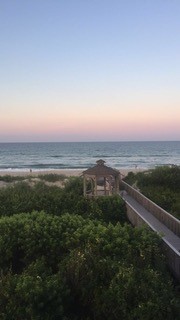Good Climate News this Week: Rules to Cut Pollution, an Offshore Wind Transmission Plan, Emissions Reduction in the EU, and More!
Apr 15, 2024
 In the summer of 2000, I took my first ever steps in North Carolina’s Outer Banks. Since then, I have had the good fortune to return to the beach every year with my family. I cherish my family’s long-standing beach traditions, from building elaborate sandcastles with my siblings, to running with the sound of the surf and the expansive ocean beside me, to walking along the shoreline with my parents. The Outer Banks is my happy place; the epitome of summertime. But for so many people, the Outer Banks is far more than a vacation destination. It is a home, a place where their families have put down roots over generations, and a cherished land that is tragically washing away.
In the summer of 2000, I took my first ever steps in North Carolina’s Outer Banks. Since then, I have had the good fortune to return to the beach every year with my family. I cherish my family’s long-standing beach traditions, from building elaborate sandcastles with my siblings, to running with the sound of the surf and the expansive ocean beside me, to walking along the shoreline with my parents. The Outer Banks is my happy place; the epitome of summertime. But for so many people, the Outer Banks is far more than a vacation destination. It is a home, a place where their families have put down roots over generations, and a cherished land that is tragically washing away.
 The Outer Banks, like countless other coastal regions, will cease to exist without immediate, drastic action. Residents of the area, or annual visitors like my family, cannot ignore the very real, very harmful effects of climate change. Sea level rise is widely recognized by climate scientists as one of the most obvious signals of a warming planet: sea water expands as it warms and glacial ice melt adds to rising water levels. Global sea rise will be felt in the form of a 39-to-55-inch increase in sea level along the Outer Banks by 2100, accelerating the pace of beach erosion. According to the North Carolina Department of Environmental Quality, about six feet of coastal land erodes each year. My beloved beach, and more importantly, others’ beloved home, is quite literally being swallowed up by the ocean.
The Outer Banks, like countless other coastal regions, will cease to exist without immediate, drastic action. Residents of the area, or annual visitors like my family, cannot ignore the very real, very harmful effects of climate change. Sea level rise is widely recognized by climate scientists as one of the most obvious signals of a warming planet: sea water expands as it warms and glacial ice melt adds to rising water levels. Global sea rise will be felt in the form of a 39-to-55-inch increase in sea level along the Outer Banks by 2100, accelerating the pace of beach erosion. According to the North Carolina Department of Environmental Quality, about six feet of coastal land erodes each year. My beloved beach, and more importantly, others’ beloved home, is quite literally being swallowed up by the ocean.
The Outer Banks is far from unique in its plight. According to the Union of Concerned Scientists, 170 communities along our nation’s coasts will be faced with chronic flooding spurred by rising sea levels by 2035. Recent hurricanes and other natural disasters, exacerbated by climate change, have killed thousands, displaced millions, and cost coastal communities billions of dollars in damages. And, the National Oceanic and Atmospheric Administration (NOAA) reports that as sea levels continue to rise, the real-world environmental and economic repercussions of climate change can no longer be ignored.
I am fortunate that, at the end of my annual week in the Outer Banks, I can retreat home to Northern Virginia. But for far too many and particularly for low-income families, in the words of Representative Kathy Castor, “The climate crisis is inescapable.”
Castor, the Congresswoman from Florida’s 14th district and chair of the House Select Committee on the Climate Crisis, introduced H.R. 9, the Climate Action Now Act. The bill, which would recommit our nation to the Paris Climate Agreement, passed the House with unanimous Democratic support and is now headed to the Senate. Yet, Senate Majority Leader Mitch McConnell has vowed that it “will go nowhere here in the Senate,” claiming that H.R. 9 is a “futile gesture to handcuff the U.S. economy through the ill-fated Paris deal.”
Measures like H.R. 9 reflect the momentum the climate crisis has generated. In the 2018 election cycle, North Carolina made major gains in its state legislature, electing more than 50 new policymakers who committed to moving toward 100 percent clean energy. This is a big environmental victory for the state, which led the nation in solar power production and renewable energy initiatives a decade ago, but then endured years of anti-environmental leadership. Now, with renewable energy advocates back at the helm of North Carolina’s state government, there is an invaluable opportunity for the state to make strides toward clean energy dominance and mitigate the impact of climate change, especially on coastal areas like the Outer Banks.
Because climate disasters such as hurricanes and rising seas disproportionately affect the lowest-income communities, forward-thinking initiatives must provide both equitable access to renewable energy and equitable protection from the most devastating impacts of climate change. We must hold legislators accountable for doing their duty to their constituents by protecting our planet before it’s too late, and for communities like the Outer Banks, time is running out.